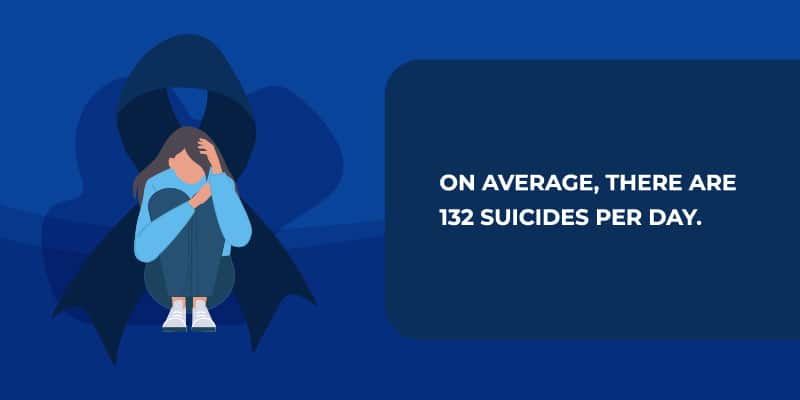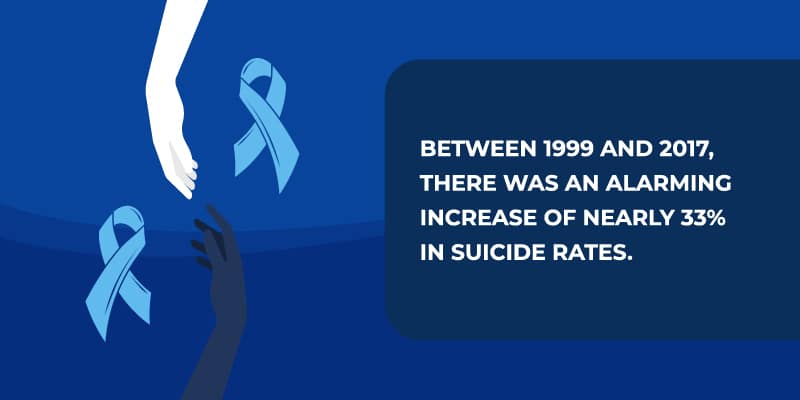
Suicidal Ideation Diagnosis and Treatment
Learn more about how J. Flowers Health Institute can help diagnose and treat suicidal ideation.
The information presented on this page is an overview of the average evaluation of suicidal ideation and is offered here as a resource. At J. Flowers Health Institute, we understand that is a deeply personal experience, so our evaluations and treatment plans are customized and tailored to each individual’s needs. We are here to provide truly comprehensive and holistic care to ensure that individuals get the support and care they need.
Table of Contents
Reach Out to Learn More
Art Therapy
Comprehensive Care for Suicidal Ideation at J. Flowers Health Institute
At J. Flowers Health Institute, we understand the severe implications of suicidal ideation on a person’s life.
With the guidance of Dr. James S. Flowers and our team of mental health specialists, we provide robust support to recognize the warning signs of suicidal ideation and offer professional, compassionate treatment.

Discovering Hope with J. Flowers Health Institute
We use comprehensive assessments to identify the possible triggers and underlying causes of your suicidal thoughts, enabling us to formulate a personalized treatment plan.
Share This Article
Categories
Top Blogs
Recent Post
What is Suicidal Ideation?
Suicidal ideation, also known as suicidal thoughts, refers to the contemplation of ending one’s own life. It is not a condition in itself, but rather a symptom of other underlying issues, often related to mental health. These thoughts can range from fleeting considerations to detailed plans.
The severity of suicidal ideation can vary greatly from person to person, and it’s not always linked to an actual intent to commit suicide. But, it is a serious symptom that needs immediate attention and care.1
A Closer Look at Suicidal Ideation
Suicidal Ideation Scale
A Suicidal Ideation Scale is a tool used by professionals to assess the severity of suicidal thoughts.2
One commonly used scale is the Beck Scale for Suicidal Ideation (BSSI). This is a 21-item self-report questionnaire designed to identify the presence and severity of specific attitudes, behaviors, and plans to commit suicide.
Each item on the scale is rated from 0 to 2, with higher scores indicating more severe suicidal ideation. The BSSI is not a diagnostic tool, but it provides valuable information for clinicians to understand the extent of your suicidal thoughts and to plan appropriate interventions.
Types of Suicidal Ideation
Suicidal ideation can be categorized into two types: passive and active:
- Passive Suicidal Ideation: Passive suicidal ideation refers to thoughts about death or a desire to die but without any plans to act on these thoughts. For example, you might wish you wouldn’t wake up in the morning or have thoughts like “I’d be better off dead.”
- Active Suicidal Ideation: Active suicidal ideation, on the other hand, involves not just thoughts about dying but also planning or intending to end one’s life. This could involve thinking about methods to commit suicide or making plans to do so.
Both types of suicidal ideation are serious and warrant immediate attention. If you’re experiencing either type, it’s important to reach out to a mental health professional or a trusted individual in your life.
How Common Is Suicidal Ideation?
In the United States, suicide ranks as the tenth leading cause of death. Between 1999 and 2017, there was an alarming increase of nearly 33% in suicide rates. According to the CDC, around 10.6 million adults in the United States struggle with active suicidal thoughts.
If you or a loved one are struggling with suicidal ideation, it’s important that you reach out to a medical professional right away or call the suicide hotline at 1-800-273-8255.4 Know that our J. Flowers Health Institute team of compassionate experts is here to help.
Suicidal Thoughts vs. Suicidal Ideation
Causes and Risk Factors for Suicidal Ideation
Several different factors can put someone at risk of struggling with suicidal ideation. Being aware of these risk factors is important to help others find help when they need it.
Common Causes of Suicidal Ideation
Suicidal ideation can be linked to multiple things, and therefore usually isn’t one specific cause. Often, numerous factors make someone more susceptible to suicidal ideation.
Genetics
Research has shown that suicidal behaviors can run in families, suggesting a genetic component. If a family member has died by suicide or has struggled with suicidal ideation, the risk for other family members can be higher.5
It’s important to remember that genetics is just one piece of the puzzle and doesn’t determine whether someone will experience suicidal ideation.
Physical Factors
Physical factors, particularly those related to mental health disorders, are significant contributors to suicidal ideation.
- Depression
- Bipolar disorder
- Schizophrenia
- Anxiety disorders
Certain medical conditions, including chronic pain or terminal illnesses, can also lead to thoughts of suicide. Substance use disorders, including alcohol and drug abuse, are another physical risk factor for suicidal ideation.
Environmental Factors
- Access to lethal means
- A history of trauma or abuse
- Prolonged stress
- Isolation or a feeling of being cut off from other people
Suicidal Ideation Risk Factors
- Previous attempts
- Going through a difficult life event that causes stress
- Feelings of isolation or hopelessness
- An undiagnosed or underlying mental health disorder
- Having access to a firearm while contemplating suicide
- Family history of substance use disorders, mental health disorders, suicide, violence, or abuse
- Being a part of the LGBTQ+ community, especially if they live in a hostile environment
Complications
If you’re feeling unsupported in your home, work, or school environment, or if you lack a supportive social circle, it can be harder to cope with suicidal ideation.

Signs and Symptoms of Suicidal Ideation
You can look out for several warning signs that a person is struggling with suicidal ideation. It depends on the person and whether they’re struggling with active or passive ideation to determine the severity of the symptoms.
Behavioral Symptoms
The most common behavioral symptoms are odd changes in behavior. A person who is struggling with suicidal ideation might withdraw from others. But, they could also become very social, especially if they have already decided to attempt.
A person might do something such as collect pills or buy a gun if they struggle with active suicidal ideation.
Physical Symptoms
- A sudden loss of energy
- Frequent headaches or stomach aches
- A change in appetite and weight
Cognitive Symptoms
Psychosocial Symptoms
Psychosocial symptoms involve changes in a person’s social behavior and emotions.
Suicidal Ideation Diagnosis
If you are struggling with suicidal thoughts, you should contact your doctor right away. Especially if you have a history of major depressive disorder, your doctor will have you take a suicidal ideation assessment.
Suicidal Ideation Assessment
Suicidal ideation assessment is often part of a comprehensive mental health evaluation. It involves a series of questions to gauge if you’re having thoughts about suicide, and if so, how often and how intensely these thoughts occur.
Children and Teenagers
Understanding suicidal ideation in children and teenagers takes sensitivity. Like adults, they may also experience thoughts of suicide.
But, expressing these thoughts might be different for them. They may not always have the words to articulate their feelings or the understanding of what suicidal ideation actually means.
Children
Children may show signs of suicidal ideation through changes in behavior, mood, or school performance.
Teenagers
- Wanting to die or kill themselves
- Feeling hopeless
- Feeling trapped or in unbearable pain
If your child is struggling with depression or expressing desires to harm themselves, it’s best to seek professional help.7 At J. Flowers Health Institute, we have comprehensive diagnostic assessment and treatment programs geared toward the unique needs of struggling adolescents.

Suicidal Ideation Treatment
Due to the profound seriousness of suicidal thoughts, physicians ensure they provide comprehensive assistance, frequently resulting in a collaborative treatment approach combining medication and therapy.
Psychotherapy Interventions for Suicidal Ideation
Psychotherapy, or talk therapy, is often the first line of treatment for suicidal ideation. This type of therapy is used to explore the root cause and understand why someone might be feeling suicidal.
- Build coping skills
- Manage triggers
- Develop a safety plan
Cognitive-Behavioral Therapy (CBT)
CBT helps you understand your thought patterns. The goal is to change negative thinking that might lead to suicidal ideation. This kind of therapy can give you the tools to recognize when you’re beginning to have harmful thoughts.
You’ll learn how to challenge these harmful thoughts and replace them with more positive, realistic ones. This can reduce the frequency and intensity of suicidal ideation over time.
Dialectical Behavior Therapy (DBT)
- Cope with stress
- Manage your emotions
- Improve your relationships with others
DBT often includes both individual therapy and group skills training, where you can practice new ways of interacting with others. This combination can be effective in reducing suicidal ideation by helping you better handle your emotions and interactions.
Interpersonal Therapy (IPT)
IPT is based on the idea that improving your relationships and social functioning can help reduce your symptoms of depression and, as a result, reduce thoughts of suicide.
- Resolving conflicts with others
- Improving social skills
- Increasing social support
Pharmacological Treatment for Suicidal Ideation
While there is no single medication specifically approved to treat suicidal ideation, some medications may help reduce your symptoms of depression or anxiety that can lead to suicidal thoughts.
Antidepressants
When these chemicals are out of balance, feelings of sadness, hopelessness, or thoughts of suicide may surface. By helping to restore balance, antidepressants can reduce the intensity and frequency of suicidal ideation.
Other Medications
Other types include mood stabilizers, which are often used for bipolar disorder, and antipsychotic medications, used for conditions where thoughts are disconnected from reality.

Treatment Program at J. Flowers Health Institute
At J. Flowers Health Institute, our team of world-class experts provides a supportive environment to identify, understand, and treat suicidal ideation.
Comprehensive Diagnostic Evaluation
Personalized Treatment Plan
Ongoing Support
A Holistic Approach to Treatment
At J. Flowers Health Institute, we believe in a holistic approach to treatment, addressing the mind, body, and spirit. We work to not only manage the symptoms but to find and treat the root cause, providing you with the tools and strategies you need to live a happier, healthier life.
Contact J. Flowers Health Institute Today
If you or a loved one is struggling with suicidal ideation, don’t hesitate to reach out to J. Flowers Health Institute today. Our dedicated team is ready to provide compassionate care and professional help when you need it the most.
Resources
- https://www.webmd.com/mental-health/suicidal-ideation
- https://www.medicinenet.com/what_is_a_suicidal_ideation_scale/article.htm
- https://www.who.int/teams/mental-health-and-substance-use/data-research/suicide-data
- https://www.verywellmind.com/suicide-rates-overstated-in-people-with-depression-2330503
- https://www.mayoclinic.org/diseases-conditions/suicide/symptoms-causes/syc-20378048
- https://www.verywellmind.com/suicidal-ideation-380609
- https://www.verywellmind.com/suicidal-thoughts-and-depression-in-children-1066661





